BUS30024 Report: Corporate Social Responsibility & Sustainability
VerifiedAdded on 2023/06/03
|8
|1521
|116
Report
AI Summary
This report provides an overview of corporate social responsibility (CSR) and its crucial role in business sustainability. It delves into the importance of CSR in enhancing the relationship between businesses and society, focusing on social, economic, and environmental activities. The report highlights the strengthening of CSR to meet current and future human aspirations, emphasizing the consideration of social, economic, and environmental factors in organizational management. It also discusses the significance of CSR in improving customer relationships and fostering better social, economic, and political environments. Furthermore, the report reviews the GRI Sustainability Reporting Guidelines and analyzes ethical codes of companies like TNK-BP and LUKOIL, concluding that these codes align with the goals of major foreign oil companies. The analysis underscores the importance of corporate social reporting as a tool for informing stakeholders and gaining a competitive advantage in business reputation. The document is contributed by a student and available on Desklib, a platform offering study tools for students.

1
Advanced Business Practices
Name:
Course
Professor’s name
University name
City, State
Date of submission
Advanced Business Practices
Name:
Course
Professor’s name
University name
City, State
Date of submission
Paraphrase This Document
Need a fresh take? Get an instant paraphrase of this document with our AI Paraphraser
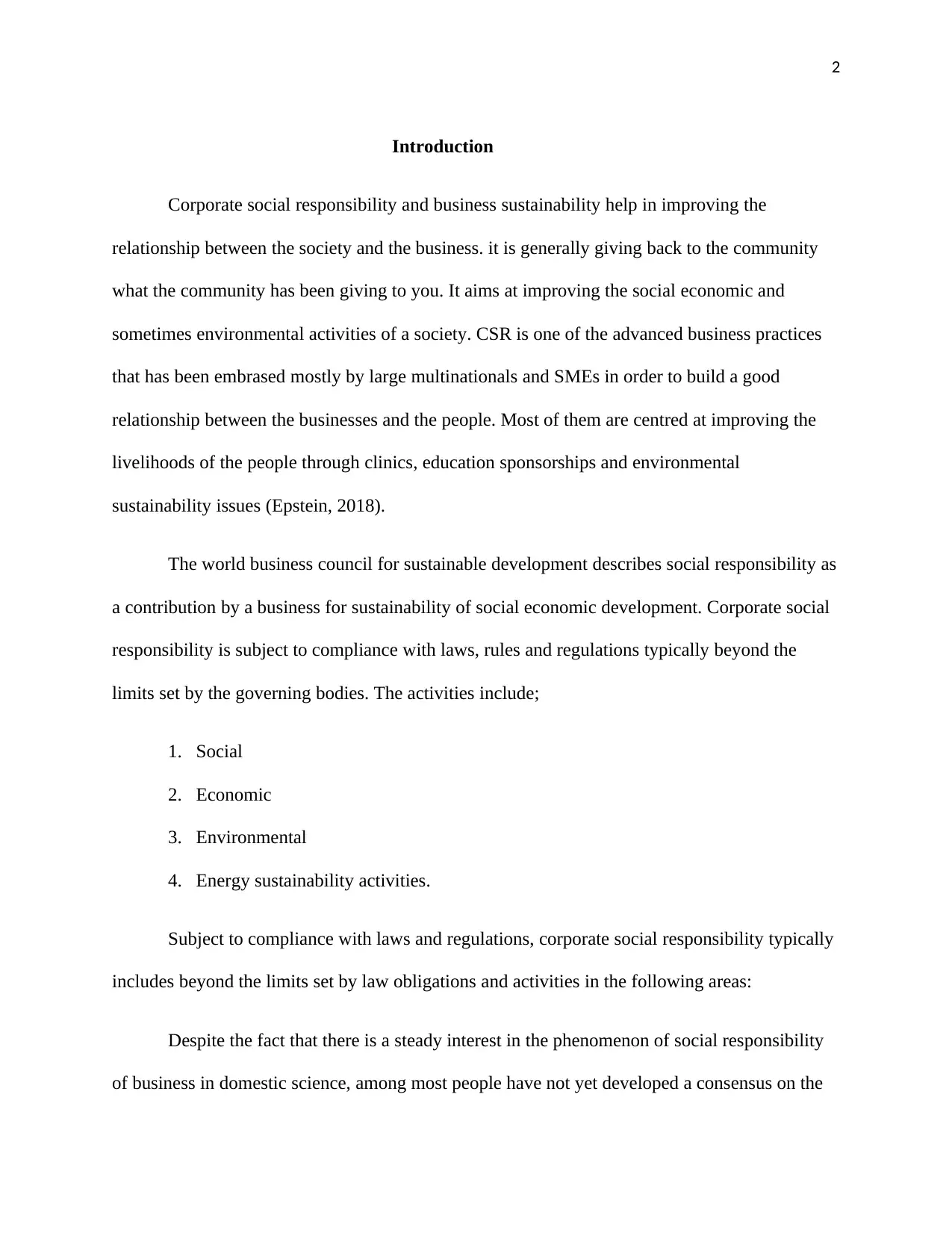
2
Introduction
Corporate social responsibility and business sustainability help in improving the
relationship between the society and the business. it is generally giving back to the community
what the community has been giving to you. It aims at improving the social economic and
sometimes environmental activities of a society. CSR is one of the advanced business practices
that has been embrased mostly by large multinationals and SMEs in order to build a good
relationship between the businesses and the people. Most of them are centred at improving the
livelihoods of the people through clinics, education sponsorships and environmental
sustainability issues (Epstein, 2018).
The world business council for sustainable development describes social responsibility as
a contribution by a business for sustainability of social economic development. Corporate social
responsibility is subject to compliance with laws, rules and regulations typically beyond the
limits set by the governing bodies. The activities include;
1. Social
2. Economic
3. Environmental
4. Energy sustainability activities.
Subject to compliance with laws and regulations, corporate social responsibility typically
includes beyond the limits set by law obligations and activities in the following areas:
Despite the fact that there is a steady interest in the phenomenon of social responsibility
of business in domestic science, among most people have not yet developed a consensus on the
Introduction
Corporate social responsibility and business sustainability help in improving the
relationship between the society and the business. it is generally giving back to the community
what the community has been giving to you. It aims at improving the social economic and
sometimes environmental activities of a society. CSR is one of the advanced business practices
that has been embrased mostly by large multinationals and SMEs in order to build a good
relationship between the businesses and the people. Most of them are centred at improving the
livelihoods of the people through clinics, education sponsorships and environmental
sustainability issues (Epstein, 2018).
The world business council for sustainable development describes social responsibility as
a contribution by a business for sustainability of social economic development. Corporate social
responsibility is subject to compliance with laws, rules and regulations typically beyond the
limits set by the governing bodies. The activities include;
1. Social
2. Economic
3. Environmental
4. Energy sustainability activities.
Subject to compliance with laws and regulations, corporate social responsibility typically
includes beyond the limits set by law obligations and activities in the following areas:
Despite the fact that there is a steady interest in the phenomenon of social responsibility
of business in domestic science, among most people have not yet developed a consensus on the
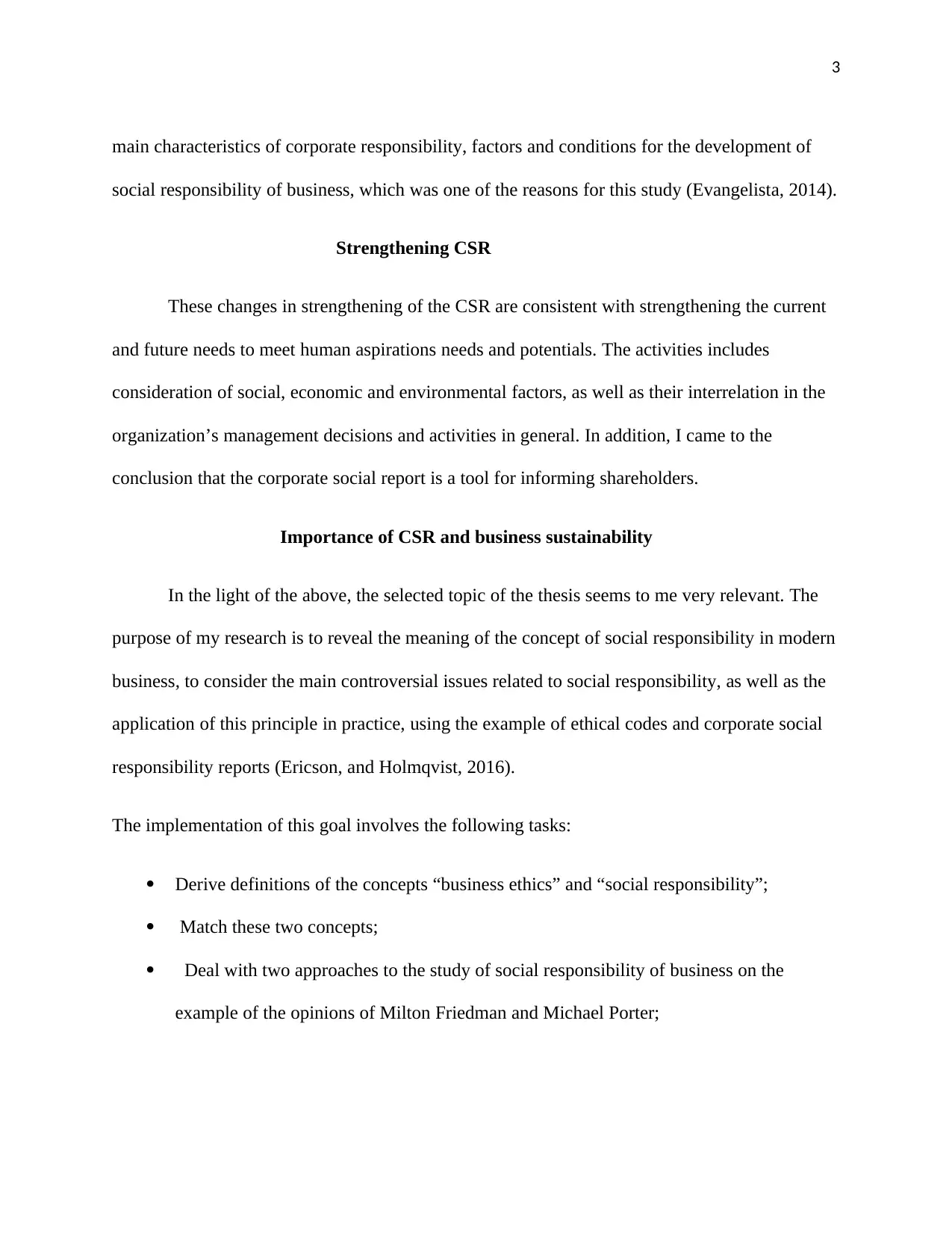
3
main characteristics of corporate responsibility, factors and conditions for the development of
social responsibility of business, which was one of the reasons for this study (Evangelista, 2014).
Strengthening CSR
These changes in strengthening of the CSR are consistent with strengthening the current
and future needs to meet human aspirations needs and potentials. The activities includes
consideration of social, economic and environmental factors, as well as their interrelation in the
organization’s management decisions and activities in general. In addition, I came to the
conclusion that the corporate social report is a tool for informing shareholders.
Importance of CSR and business sustainability
In the light of the above, the selected topic of the thesis seems to me very relevant. The
purpose of my research is to reveal the meaning of the concept of social responsibility in modern
business, to consider the main controversial issues related to social responsibility, as well as the
application of this principle in practice, using the example of ethical codes and corporate social
responsibility reports (Ericson, and Holmqvist, 2016).
The implementation of this goal involves the following tasks:
Derive definitions of the concepts “business ethics” and “social responsibility”;
Match these two concepts;
Deal with two approaches to the study of social responsibility of business on the
example of the opinions of Milton Friedman and Michael Porter;
main characteristics of corporate responsibility, factors and conditions for the development of
social responsibility of business, which was one of the reasons for this study (Evangelista, 2014).
Strengthening CSR
These changes in strengthening of the CSR are consistent with strengthening the current
and future needs to meet human aspirations needs and potentials. The activities includes
consideration of social, economic and environmental factors, as well as their interrelation in the
organization’s management decisions and activities in general. In addition, I came to the
conclusion that the corporate social report is a tool for informing shareholders.
Importance of CSR and business sustainability
In the light of the above, the selected topic of the thesis seems to me very relevant. The
purpose of my research is to reveal the meaning of the concept of social responsibility in modern
business, to consider the main controversial issues related to social responsibility, as well as the
application of this principle in practice, using the example of ethical codes and corporate social
responsibility reports (Ericson, and Holmqvist, 2016).
The implementation of this goal involves the following tasks:
Derive definitions of the concepts “business ethics” and “social responsibility”;
Match these two concepts;
Deal with two approaches to the study of social responsibility of business on the
example of the opinions of Milton Friedman and Michael Porter;
⊘ This is a preview!⊘
Do you want full access?
Subscribe today to unlock all pages.

Trusted by 1+ million students worldwide
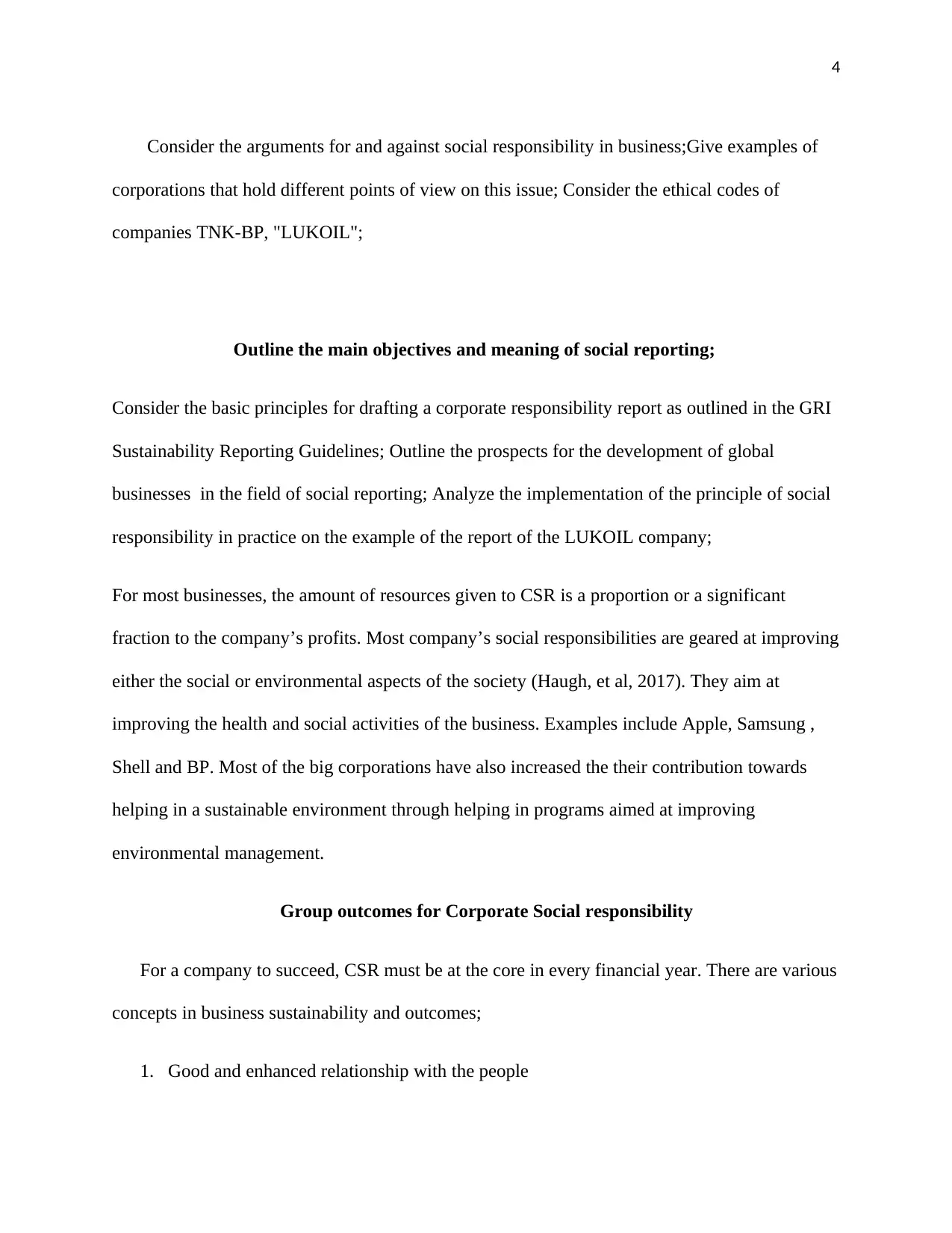
4
Consider the arguments for and against social responsibility in business;Give examples of
corporations that hold different points of view on this issue; Consider the ethical codes of
companies TNK-BP, "LUKOIL";
Outline the main objectives and meaning of social reporting;
Consider the basic principles for drafting a corporate responsibility report as outlined in the GRI
Sustainability Reporting Guidelines; Outline the prospects for the development of global
businesses in the field of social reporting; Analyze the implementation of the principle of social
responsibility in practice on the example of the report of the LUKOIL company;
For most businesses, the amount of resources given to CSR is a proportion or a significant
fraction to the company’s profits. Most company’s social responsibilities are geared at improving
either the social or environmental aspects of the society (Haugh, et al, 2017). They aim at
improving the health and social activities of the business. Examples include Apple, Samsung ,
Shell and BP. Most of the big corporations have also increased the their contribution towards
helping in a sustainable environment through helping in programs aimed at improving
environmental management.
Group outcomes for Corporate Social responsibility
For a company to succeed, CSR must be at the core in every financial year. There are various
concepts in business sustainability and outcomes;
1. Good and enhanced relationship with the people
Consider the arguments for and against social responsibility in business;Give examples of
corporations that hold different points of view on this issue; Consider the ethical codes of
companies TNK-BP, "LUKOIL";
Outline the main objectives and meaning of social reporting;
Consider the basic principles for drafting a corporate responsibility report as outlined in the GRI
Sustainability Reporting Guidelines; Outline the prospects for the development of global
businesses in the field of social reporting; Analyze the implementation of the principle of social
responsibility in practice on the example of the report of the LUKOIL company;
For most businesses, the amount of resources given to CSR is a proportion or a significant
fraction to the company’s profits. Most company’s social responsibilities are geared at improving
either the social or environmental aspects of the society (Haugh, et al, 2017). They aim at
improving the health and social activities of the business. Examples include Apple, Samsung ,
Shell and BP. Most of the big corporations have also increased the their contribution towards
helping in a sustainable environment through helping in programs aimed at improving
environmental management.
Group outcomes for Corporate Social responsibility
For a company to succeed, CSR must be at the core in every financial year. There are various
concepts in business sustainability and outcomes;
1. Good and enhanced relationship with the people
Paraphrase This Document
Need a fresh take? Get an instant paraphrase of this document with our AI Paraphraser
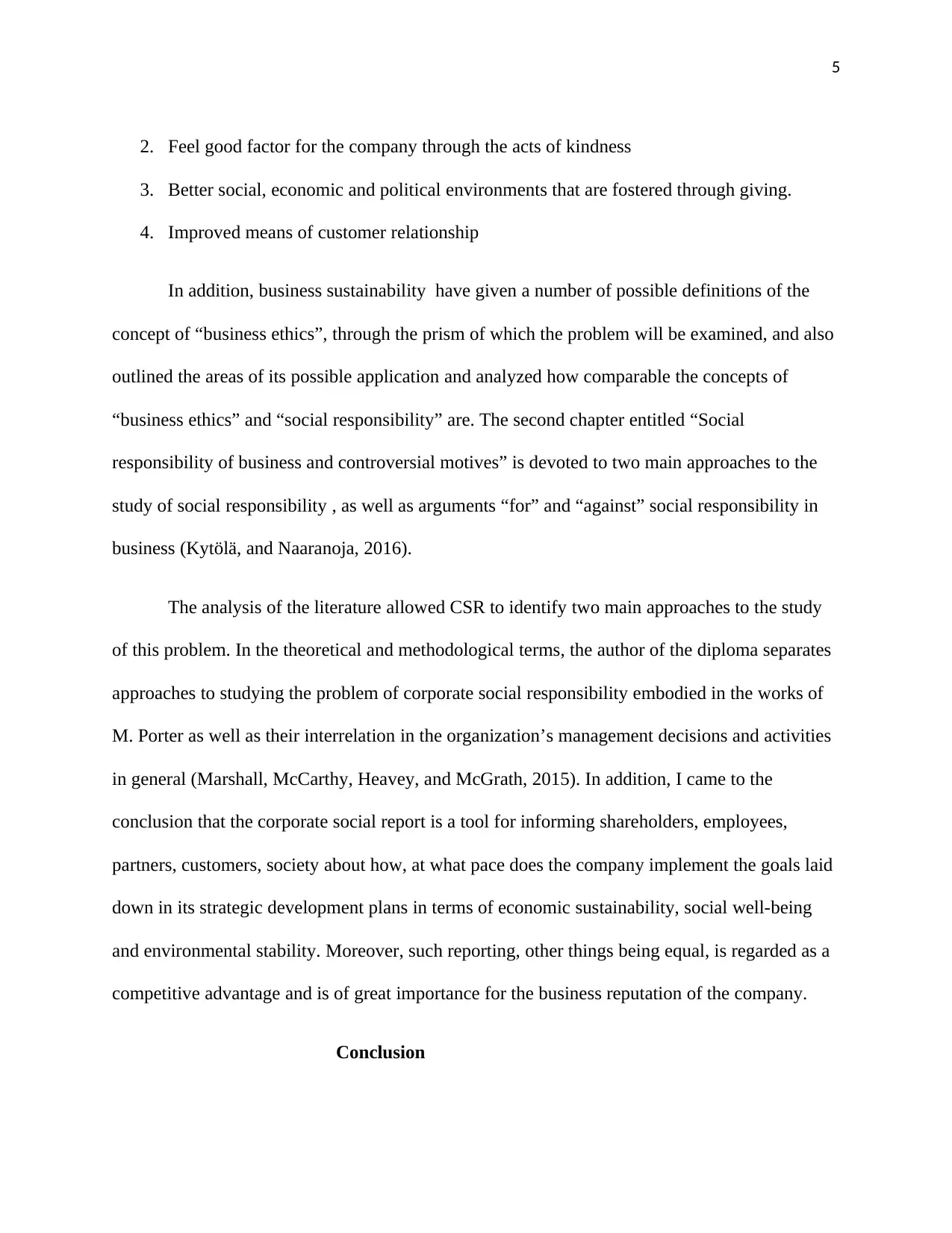
5
2. Feel good factor for the company through the acts of kindness
3. Better social, economic and political environments that are fostered through giving.
4. Improved means of customer relationship
In addition, business sustainability have given a number of possible definitions of the
concept of “business ethics”, through the prism of which the problem will be examined, and also
outlined the areas of its possible application and analyzed how comparable the concepts of
“business ethics” and “social responsibility” are. The second chapter entitled “Social
responsibility of business and controversial motives” is devoted to two main approaches to the
study of social responsibility , as well as arguments “for” and “against” social responsibility in
business (Kytölä, and Naaranoja, 2016).
The analysis of the literature allowed CSR to identify two main approaches to the study
of this problem. In the theoretical and methodological terms, the author of the diploma separates
approaches to studying the problem of corporate social responsibility embodied in the works of
M. Porter as well as their interrelation in the organization’s management decisions and activities
in general (Marshall, McCarthy, Heavey, and McGrath, 2015). In addition, I came to the
conclusion that the corporate social report is a tool for informing shareholders, employees,
partners, customers, society about how, at what pace does the company implement the goals laid
down in its strategic development plans in terms of economic sustainability, social well-being
and environmental stability. Moreover, such reporting, other things being equal, is regarded as a
competitive advantage and is of great importance for the business reputation of the company.
Conclusion
2. Feel good factor for the company through the acts of kindness
3. Better social, economic and political environments that are fostered through giving.
4. Improved means of customer relationship
In addition, business sustainability have given a number of possible definitions of the
concept of “business ethics”, through the prism of which the problem will be examined, and also
outlined the areas of its possible application and analyzed how comparable the concepts of
“business ethics” and “social responsibility” are. The second chapter entitled “Social
responsibility of business and controversial motives” is devoted to two main approaches to the
study of social responsibility , as well as arguments “for” and “against” social responsibility in
business (Kytölä, and Naaranoja, 2016).
The analysis of the literature allowed CSR to identify two main approaches to the study
of this problem. In the theoretical and methodological terms, the author of the diploma separates
approaches to studying the problem of corporate social responsibility embodied in the works of
M. Porter as well as their interrelation in the organization’s management decisions and activities
in general (Marshall, McCarthy, Heavey, and McGrath, 2015). In addition, I came to the
conclusion that the corporate social report is a tool for informing shareholders, employees,
partners, customers, society about how, at what pace does the company implement the goals laid
down in its strategic development plans in terms of economic sustainability, social well-being
and environmental stability. Moreover, such reporting, other things being equal, is regarded as a
competitive advantage and is of great importance for the business reputation of the company.
Conclusion
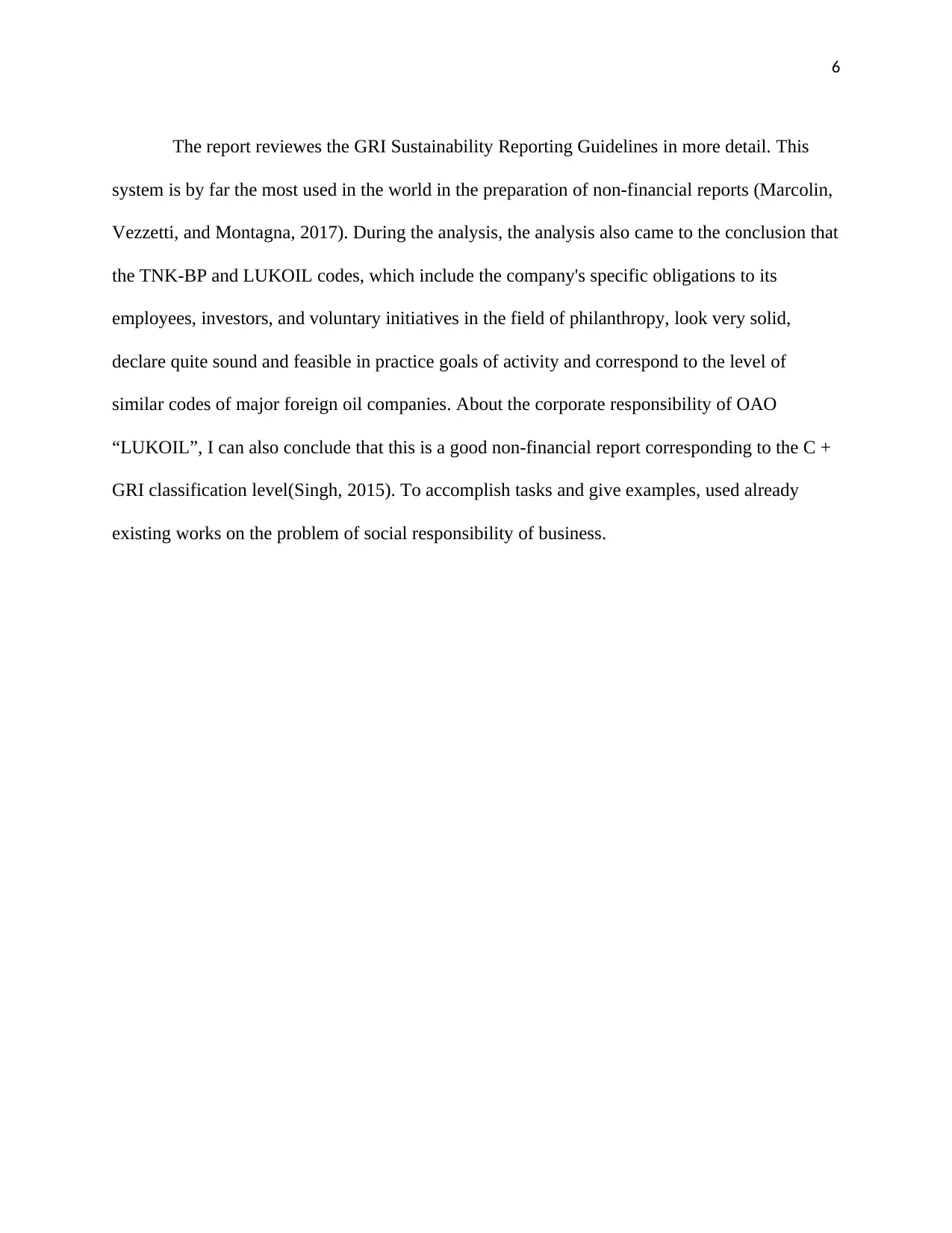
6
The report reviewes the GRI Sustainability Reporting Guidelines in more detail. This
system is by far the most used in the world in the preparation of non-financial reports (Marcolin,
Vezzetti, and Montagna, 2017). During the analysis, the analysis also came to the conclusion that
the TNK-BP and LUKOIL codes, which include the company's specific obligations to its
employees, investors, and voluntary initiatives in the field of philanthropy, look very solid,
declare quite sound and feasible in practice goals of activity and correspond to the level of
similar codes of major foreign oil companies. About the corporate responsibility of OAO
“LUKOIL”, I can also conclude that this is a good non-financial report corresponding to the C +
GRI classification level(Singh, 2015). To accomplish tasks and give examples, used already
existing works on the problem of social responsibility of business.
The report reviewes the GRI Sustainability Reporting Guidelines in more detail. This
system is by far the most used in the world in the preparation of non-financial reports (Marcolin,
Vezzetti, and Montagna, 2017). During the analysis, the analysis also came to the conclusion that
the TNK-BP and LUKOIL codes, which include the company's specific obligations to its
employees, investors, and voluntary initiatives in the field of philanthropy, look very solid,
declare quite sound and feasible in practice goals of activity and correspond to the level of
similar codes of major foreign oil companies. About the corporate responsibility of OAO
“LUKOIL”, I can also conclude that this is a good non-financial report corresponding to the C +
GRI classification level(Singh, 2015). To accomplish tasks and give examples, used already
existing works on the problem of social responsibility of business.
⊘ This is a preview!⊘
Do you want full access?
Subscribe today to unlock all pages.

Trusted by 1+ million students worldwide
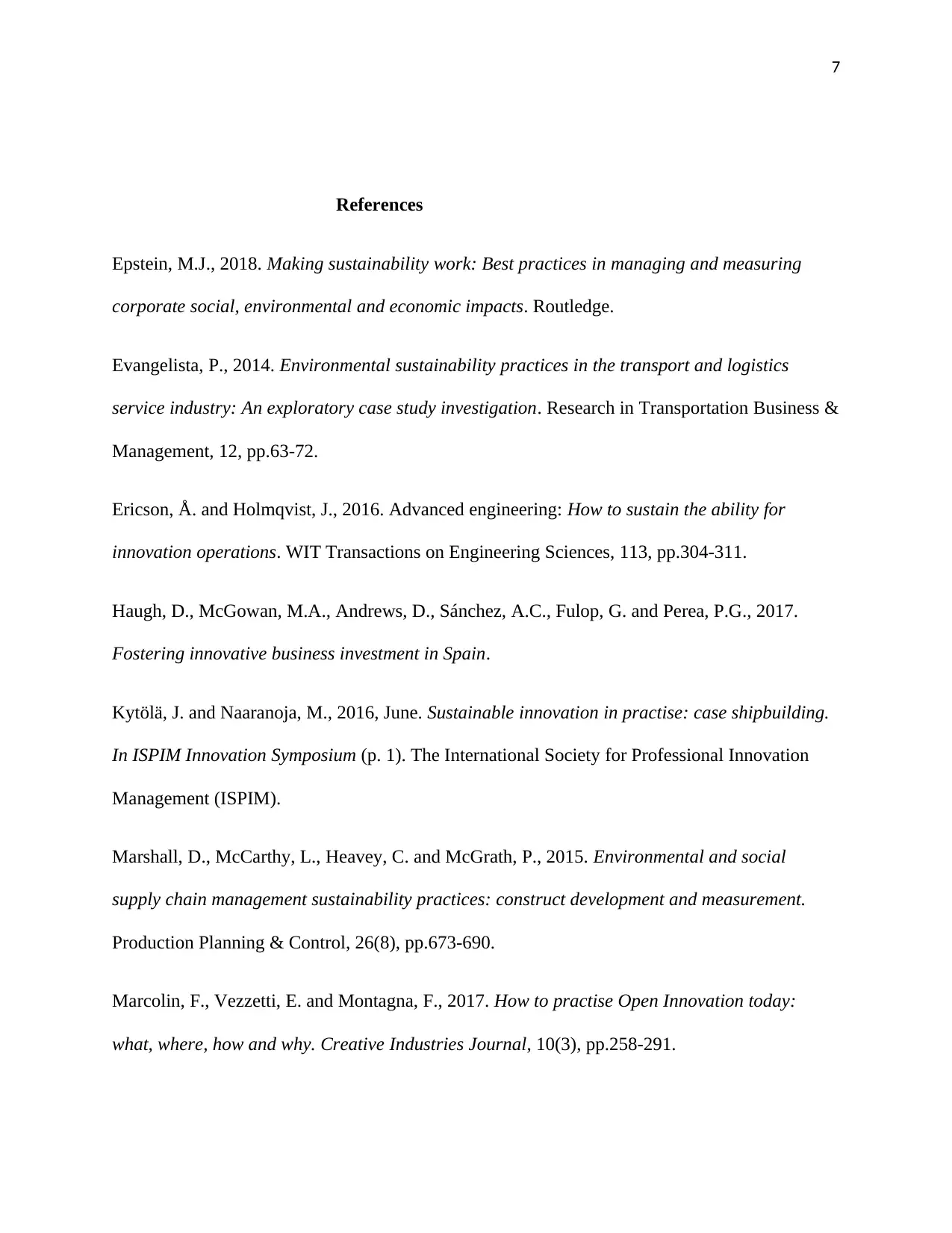
7
References
Epstein, M.J., 2018. Making sustainability work: Best practices in managing and measuring
corporate social, environmental and economic impacts. Routledge.
Evangelista, P., 2014. Environmental sustainability practices in the transport and logistics
service industry: An exploratory case study investigation. Research in Transportation Business &
Management, 12, pp.63-72.
Ericson, Å. and Holmqvist, J., 2016. Advanced engineering: How to sustain the ability for
innovation operations. WIT Transactions on Engineering Sciences, 113, pp.304-311.
Haugh, D., McGowan, M.A., Andrews, D., Sánchez, A.C., Fulop, G. and Perea, P.G., 2017.
Fostering innovative business investment in Spain.
Kytölä, J. and Naaranoja, M., 2016, June. Sustainable innovation in practise: case shipbuilding.
In ISPIM Innovation Symposium (p. 1). The International Society for Professional Innovation
Management (ISPIM).
Marshall, D., McCarthy, L., Heavey, C. and McGrath, P., 2015. Environmental and social
supply chain management sustainability practices: construct development and measurement.
Production Planning & Control, 26(8), pp.673-690.
Marcolin, F., Vezzetti, E. and Montagna, F., 2017. How to practise Open Innovation today:
what, where, how and why. Creative Industries Journal, 10(3), pp.258-291.
References
Epstein, M.J., 2018. Making sustainability work: Best practices in managing and measuring
corporate social, environmental and economic impacts. Routledge.
Evangelista, P., 2014. Environmental sustainability practices in the transport and logistics
service industry: An exploratory case study investigation. Research in Transportation Business &
Management, 12, pp.63-72.
Ericson, Å. and Holmqvist, J., 2016. Advanced engineering: How to sustain the ability for
innovation operations. WIT Transactions on Engineering Sciences, 113, pp.304-311.
Haugh, D., McGowan, M.A., Andrews, D., Sánchez, A.C., Fulop, G. and Perea, P.G., 2017.
Fostering innovative business investment in Spain.
Kytölä, J. and Naaranoja, M., 2016, June. Sustainable innovation in practise: case shipbuilding.
In ISPIM Innovation Symposium (p. 1). The International Society for Professional Innovation
Management (ISPIM).
Marshall, D., McCarthy, L., Heavey, C. and McGrath, P., 2015. Environmental and social
supply chain management sustainability practices: construct development and measurement.
Production Planning & Control, 26(8), pp.673-690.
Marcolin, F., Vezzetti, E. and Montagna, F., 2017. How to practise Open Innovation today:
what, where, how and why. Creative Industries Journal, 10(3), pp.258-291.
Paraphrase This Document
Need a fresh take? Get an instant paraphrase of this document with our AI Paraphraser

8
Singh, H.D.B., 2015. Achieving environmental sustainability of Small and Medium Enterprises
through selective supplier development programs. Int. J. Adv. Res. Manag. Soc. Sci, 4, pp.35-50.
Singh, H.D.B., 2015. Achieving environmental sustainability of Small and Medium Enterprises
through selective supplier development programs. Int. J. Adv. Res. Manag. Soc. Sci, 4, pp.35-50.
1 out of 8
Related Documents
Your All-in-One AI-Powered Toolkit for Academic Success.
+13062052269
info@desklib.com
Available 24*7 on WhatsApp / Email
![[object Object]](/_next/static/media/star-bottom.7253800d.svg)
Unlock your academic potential
Copyright © 2020–2026 A2Z Services. All Rights Reserved. Developed and managed by ZUCOL.




